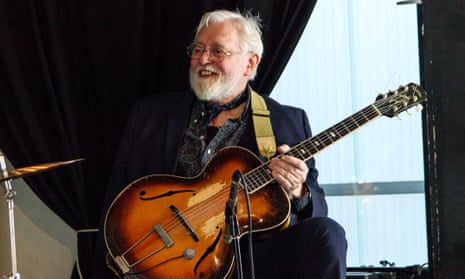In 1971 John Russell left the remote Romney Marshes of Kent for London’s booming avant-arts scene as a 17-year-old blues and Frank Zappa fan, and was soon playing the guitar in such unrecognisable ways that even his contrarian Mothers of Invention hero might have raised an eyebrow.
Russell, who has died aged 66 of cancer, was the polar opposite of a guitar star - an obdurate original in the spiky mould of his influential teacher and mentor Derek Bailey, and in later years an energetic promoter of genre-evading free improvisation.
For almost five decades, he performed with prominent players from inside and outside jazz, including the saxophone virtuoso Evan Parker and the drummer John Stevens, the multi-instrumentalist and composer Steve Beresford, the lyrical jazz trumpeter Henry Lowther, Thurston Moore of Sonic Youth, and jazz and contemporary music edge-cutters from across Europe’s improv scenes, as well as, in his later years, in Japan.
Russell was a persuasive promoter and campaigner as well as a performer, working on cooperatively run new-music ventures, from magazines to cottage-industry record labels. He was also a founder of the Mopomoso club – the UK’s longest-running musical event with an almost entirely free-improvisational agenda.
But it was as a guitarist, often playing unaccompanied and unplugged on a well-worn 1936 Radiotone archtop instrument, that Russell was most treasured by devotees of free-improv – for his cryptically captivating narratives of percussive, sharply plucked chords, glittering harmonics and nuanced timbres, flurries of scrambling runs and feverishly strummed rhythms.
Sometimes Russell could typify the kind of implacable idiom-demolitionist that improv’s detractors loved to hate, but there was a palpable warmth and thoughtfulness to his work. Occasionally his playing even seemed to glimpse some long-gone bluesman coaxing soulful memories out of a battered acoustic instrument on a back porch.
Born in Battersea, south-west London, John was the son of Wenda Weston and Derek Russell. When he was 15 months old, his father took him to live with his paternal grandparents, Rodney and Jean Russell in the village of Ruckinge, on the edge of Romney Marshes – after which, he never saw his mother again and his father visited infrequently. A guitar-playing classmate at his grammar school in Ashford made him a guitar fan, and one day his grandfather presented the boy with a budget steel-strung acoustic.
At 14, Russell bought the 1968 compilation album The Rock Machine Turns You On, and the Mothers of Invention’s We’re Only in It for the Money (playing them on a DIY deck made in his school woodwork class, hitched to an old radio), and soon discovered Muddy Waters, John Mayall and King Crimson’s Robert Fripp, and 1970s progressive and blues-rock bands including Soft Machine and Blodwyn Pig.
He formed his own local rock band, but also delved into modern classical music’s 12-tone techniques, and John Cage’s ideas on indeterminacy and hybrid instruments, and got wind of Bailey through an article by Fripp. Those discoveries triggered an early detour from progressive rock to experimental music from which he never returned.
On leaving school at 16, he took farm-labouring work. He began travelling to London to Sunday gigs at Ronnie Scott’s Club run by the Musicians’ Cooperative, a circle including Bailey and Parker. Russell began a year of lessons in orthodox guitar technique with Bailey, and often jammed with like-minded partners at the Little Theatre Club, in Covent Garden, a performance workshop run by Stevens.
From the mid-70s onwards, a younger coterie of improvisers including Russell emerged with less jazz-specific backgrounds than their Musicians’ Cooperative forerunners. In 1976 Russell did record an unaccompanied improvisation from his Kent bedroom as part of the album Home Cooking, later released on the Cooperative’s Incus label, with its cover picturing Russell and his beloved grandmother on the steps of the converted army hut that had been his childhood home. In 1975 he helped to launch Musics magazine, and the London Musicians’ Collective (LMC), and co-founded CAW Records and the ACTA label. In the 80s and 90s, Russell recorded extensively, often for Martin and Madelaine Davidson’s Emanem label.
In the early 80s, Russell’s three-night Fetes Quaqua projects, at the LMC premises in Camden, north London, began to present impromptu combinations of improvisers decided on the night. The Mopomoso club nights, conceived as showcases for virtuosi and novices alike, began at the Red Rose in Holloway from 1991 to 2008, and ran thereafter at the Vortex Jazz Club.
From the early 2000s up to 2019, Russell was a regular visitor to Japan’s vibrant free music scene, often performing with the veteran drummer Sabu Toyazumi, whom he also invited to London for Fetes Quaqua events. In 2008 the film-maker Helen Petts brought Mopomoso into the digital age with its own website and online concert videos, and the following year Russell, Parker and the bassist John Edwards formed a trio that remained powerfully active until the guitarist’s last months.
Russell fitfully returned to the electric guitar after 2009, and in 2013 undertook a nine-member Mopomoso UK tour, later documented as the box-set Making Rooms.
After his cancer diagnosis, although breaks for surgery and chemotherapy hampered him, Russell’s playing never lost its caustic lyricism. In 2020, in response to the pandemic’s devastating impact on live performance, he and a friend launched the Mopomoso TV channel to keep the flame alive. Often genially compering the platform’s events himself in a colourful variety of snappy suits and hats, Russell kept rooting for free-improvisation, and the communal delights of spontaneous live performance.
Russell is survived by Joanna Green, his partner of 41 years.

Comments (…)
Sign in or create your Guardian account to join the discussion